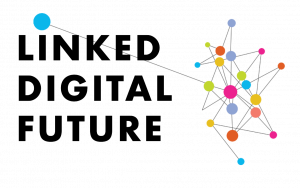The objective of this research report was to identify concrete recommendations for the implementation of shared semantic technologies across the performing arts value chain with the intent of improving data systems interoperability and enhancing the discoverability of the performing arts by consumers.
Executive Summary
LDF research lays the foundations for ensuing prototyping and development phases, providing direction for a digital literacy campaign that will roll out in the arts sector, and inform the deliberations of the Advisory Committee on potential governance structures.
LDF research catalogues various initiatives at the international level to establish a linked open data ecosystem for the performing arts. Most of these initiatives emerge from the heritage and research sectors; very few directly address the primary value chain of the performing arts, involving performing arts professionals, production companies, presenting organizations, operators of arts facilities, dissemination platforms, and concert/theatre goers. By placing primary focus on performing arts stakeholders, LDFI is breaking new ground.
Comparative analysis of the usage scenarios of different stakeholder groups has shown that the respective requirements for data overlap considerably; the core elements of the data model are consistent across sectors. This means that substantial synergies are to be expected not only with regard to data maintenance, but also in view of the development of other parts of the data infrastructure, including platforms for data entry, services for data extraction, analysis and visualization, or the provision of data and/or media repositories.
Furthermore, exchanges with LDF project members and institutions in other countries have shown that many usage scenarios related to a linked open data ecosystem for the performing arts have international relevance. There are also important usage overlaps regarding repertoire as well as artists and artists’ collectives. Given the many links between Canadian performing arts metadata and similar data from other countries, international cooperation should be strengthened.
To facilitate the implementation of the technical solutions to be developed as part of LDF initiative, an initial conceptual model and formal ontology were developed based on existing data models.
Data modelling was guided by a set of sample resources describing current performing arts productions and performance events in Canada. The data from the sample resources has been published as linked open data and serves as a basis for discussion as the model continues to develop.
Prototyping and implementation of two Canadian use cases to be pursued during the remainder of LDFI have been initiated with the proposed next steps:
RIDEAU’s ScènePro is a centralized information system for the performing arts production market.
It is meant to integrate and facilitate a number of operations such as showcase application, event registration, and block-booking. Some of the primary goals of ScènePro are to reduce manual data population within different systems and enable use of the same core data across a number of business processes.
Culture Creates’ Footlight technology harvests event information on websites and translates it into machine-readable metadata.
Upon validation of the data by the presenters of these events, the metadata is republished as html-embedded JSON-LD on organizations’ websites and also populated as linked open data in the Artsdata.ca knowledge graph. Culture Creates’ Footlight technology thus enables performing arts organizations to easily create and expose machine-readable metadata without developing expertise on semantic technologies.
Both applications contribute to and consume data from the Artsdata.ca performing arts knowledge graph.
At present, the graph database is still in its infancy, but the shared effort is on eventually assembling all relevant data about current and future performing arts events in Canada and by Canadian artists or artists’ collectives abroad. The creation of Artsdata.ca aspires to give the arts sector some control over its own data in a digital environment ruled by recommendation algorithms that help people plan their leisure time; an activity increasingly reliant on quality structured data in order to deliver pertinent results. Artsdata.ca is open to further data providers and may serve a variety of use cases beyond consumption.
To better equip itself for the digital world, members of the performing arts sector are strongly advised to embrace the linked open data approach proposed in this report. To support this process, the LDF team is planning a digital literacy campaign for the Canadian arts sector.
Based on the key insights gained through the action research, the LDF Advisory Committee has adopted five recommendations to be taken into account during this and similar initiatives:
Immediate focus should be placed on populating a Canadian performing arts knowledge graph.
To do so, data about current and future events should be ingested into a knowledge graph via current and future LDFI prototyping partners or made available through interoperable data systems. In addition to ingesting event data, existing databases that contain data about works, venues, persons, and organizations involved in performing arts productions should be ingested or linked.
Wikidata is complementary to Artsdata.ca
Efforts should therefore be undertaken to contribute to its population with performing arts related data that is of relevance in the context of the Canadian knowledge graph.
A data governance framework needs to be developed
in cooperation with representatives from across the arts sector to establish who is able to share what type of data with whom, and who will have authority over data.
Further research is needed to better understand user requirements
with regard to the adoption of linked open data practices in existing and emerging service offerings. It is crucial to create incentives for stakeholders who are expected to make an additional effort to contribute or enhance performing arts related data.
Further effort is required to develop and describe (novel) business models
that leverage and maintain a well-functioning linked open data ecosystem for the performing arts. It is essential to evaluate the long-term economic sustainability for individual contributions to the common knowledge graph by key players in the performing arts value network.




